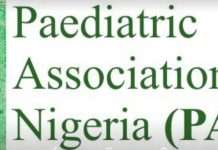– As parents show hesitancy

At the beginning of the year, precisely in the last week of January, the Executive Secretary of the National Primary Health Care Development Agency (NPHCDA) Dr Faisal Shuaib, came up with the cheering news of integrating childhood immunisation into the COVID-19 mass vaccination exercise going on at the time, but he was silent about the availability of COVID-19 vaccines for children in the country.
Meanwhile the World Health Organisation (WHO) and the United Nations Children’s Fund (UNICEF) have thrown their weights behind COVID-19 vaccination for children, to reduce morbidity and mortality, particularly among children and adolescents who are at high risk of severe forms of the disease.
According to the WHO’s Strategic Advisory Group of Experts (SAGE) two COVID-19 vaccines – Pfizer and Moderna – are safe to be used for children, aged five and above, as well as adolescents aged 12 and above. A smaller dosage is required for children than for adults.
In fact, reports have it that UNICEF was partnering federal government on the availability of COVID-19 vaccines for Nigerian children about a year ago, but not much has been heard about the partnership since then. Reasons cited for delay in receiving the vaccines include procedural screening to ensure that the vaccines are safe for the children.
In a telephone interview with Geoffrey Njoku, communication specialist, UNICEF Nigeria, he confirmed that childhood COVID-19 vaccination is yet to commence in Nigeria.
“No child has received COVID-19 vaccination in Nigeria,” he said.
Also speaking with the Apex Chief Nursing Officer of Agbowa Primary Healthcare Centre, Ikorodu, Mrs Mary Omolua, she also affirmed that childhood COVID-19 vaccination is yet to take off across centres in Lagos.
She said, “COVID-19 vaccination has not started for children in the state”.
Different strokes
However, while most practitioners are concerned about the delay, especially as many countries of the world, such as the USA, Italy, Spain, Ireland and France, have commenced childhood COVID-19 vaccination, Nigerian parents are indifferent to the exercise. This may not come as a surprise as many of them have actually declined taking the adult doses.
In a chat with some mothers in Lagos State on the issue, there was obvious nonchalance in their disposition, with a good number of them saying that it is even better that the children’s vaccine is not available.
Mrs Toluwani Ajayi from Shomolu revealed her concerns about the safety of the vaccines for children. “How safe is this vaccine for children? The same way they told us the adult COVID-19 vaccines are safe and we have heard a lot of negative stories about them? Even if the children vaccine is available, I’m not sure I will allow my children to take it for now” she stated.
Mr Chukwudi Kanu expressed same reservations, saying himself had not taken the vaccine as an adult, much less allow his children, given the adverse effects on his friends that got the jab.
He avowed, “If the vaccines eventually arrive for children, I will not allow my children to take it because I can’t give to my children what I cannot eat.”
“As for me,” said Mrs Kemi Ajala, another parent, “if I am given full assurance that the Pfizer and Moderna vaccines are very safe for my children, I will allow them take, because I was opportune to get the Moderna shot, and it was very mild on me, compared to the horrible experiences of my colleagues who got the Astra Zeneca jab.”
She added: “One thing I want the government to do is to ensure that these vaccines are not expired and they are well tolerable in children’s system”.
Experts’ assurance
Allaying the fears pf parents on childhood COVID-19 vaccination, practitioners have stated that vaccinating children can reduce the risk of COVID-19 infection for children and those around them.
They averred that one dose of the COVID-19 vaccine gives good protection against children getting seriously ill with the infection, adding that two doses give a stronger and longer-lasting protection against future COVID-19 variants.
While it is recommended that children can get a first dose of the vaccine from the day they turn five, most children can get a second dose from 12 weeks after the first.
However, if a child has a condition that makes him or her at high risk from COVID-19 or lives with someone who has a weakened immune system, such can get a second dose from eight weeks after the first











